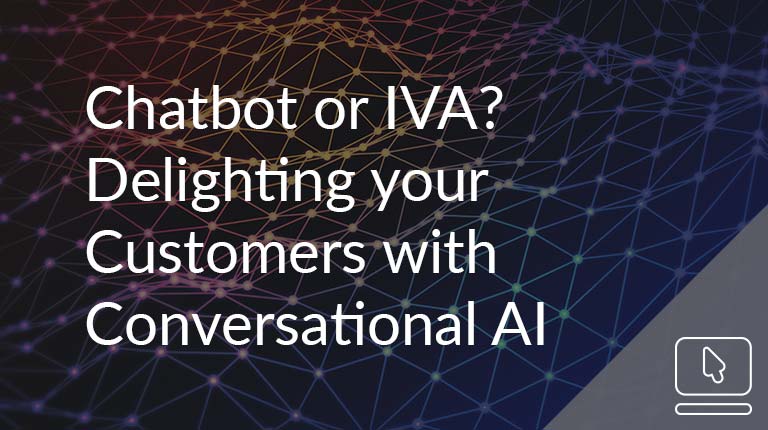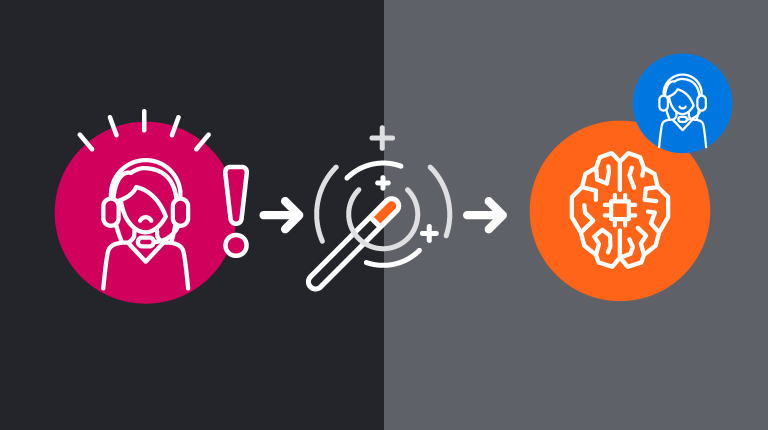Traditionally, automation has seemed like the next-best option to a live representative. It’s something that call centers needed in order to handle large call volumes, but it was not necessarily something that was embraced. It was the lesser of two evils: make your customers wait on hold for 30 minutes until a live agent is available, or allow them to maybe get their task done with an IVR.
The benefits of these traditional automated systems are minimal. Sure, they cost less, but they often leave customers frustrated. And while they are able to handle higher volumes of calls, they often can only complete basic requests.
However, technology has evolved to a place where not only can Conversational AI applications, like Intelligent Virtual Assistants, perform the same tasks as live human agents, they can perform them better.
We know that’s a bold statement. Can technology really help customers better than a human? In most cases, we say yes. Here’s why:
Conversational AI applications are more consistent.
A bad customer service experience can easily result in a lost customer. And for companies that handle thousands of customer interactions every day, making sure every single one of those conversations is positive can be a near impossible task.
That’s where Intelligent Virtual Assistants (IVA), also called Intelligent Virtual Agents come in. They always stay consistent to the business rules, always have a good attitude, and never get overwhelmed by large call volumes. This ensures a consistent positive customer experience for every single customer that comes into contact with the company.
Unlike human agents who get bored from mundane tasks like resetting passwords over and over again, IVAs approach each mundane task with the same high level of enthusiasm, effort, and care. This not only results in a better customer experience from the IVA, but also increases the value of the agent’s job, which means less agent churn.
Conversational AI applications learn more, because they handle more Interactions.
AI, like humans, can learn from past experiences to increase their knowledge. Because an IVA handles a far greater number of interactions than a human, they have a greater pool of knowledge to learn and develop insights from. Also, IVAs have a higher capacity for knowledge retention and prediction, meaning that they can detect patterns from calls faster and use it to deliver a better customer experience for future customers.
For example, if a significant number of customers were calling about a faulty product, by knowing the past purchases of the customer associated with the phone number, an IVA would be able to predict the issue. This allows for preemptive communication from the IVA to solve the problem faster.
They are not limited by the number of customer they can help.
Perhaps the most basic, but most essential, advantage of a Conversational AI application over a human is that they are able to handle an unlimited number of calls at one time. Humans can only complete one call at a time. So, when increasing the volume of calls, naturally you would need to hire more agents. When there are unexpected call volume spikes, there often is not a way to hire and train additional agents fast enough, which results in long wait times and bad customer experiences for customers.
With an automated system, these call volume spikes can be handled without detracting from customer experience quality. But in order to maintain the positive customer experience level, the system has to be advanced enough to listen and respond on a human level. Otherwise, customers will be equally as frustrated with the automated system as they are with the long wait times.
However, with an Intelligent Virtual Assistant, the quality of the interaction is the same (or better) than a human agent, so its ability to handle an unlimited number of conversations becomes a huge plus.
The assumption behind these advantages:
Of course, it’s important to remember that not all virtual assistants are created equal. While these advantages can be achieved with some, top-of-the-line Conversational AI applications, there are still going to be automated systems that are not sophisticated enough to deliver this caliber of service. When looking for an Intelligent Virtual Assistant, check out our guide here to help ensure that the technology is one that your customers will love, not just tolerate.
In conclusion, It’s not to say that humans don’t have a place in customer service. When it comes to some tasks, especially with overly complicated requests that require approval outside of business rules, humans are very relevant. But with an Intelligent Virtual Agent, humans can spend more time focusing on those tasks that only they can solve, and the IVA can handle the rest.





